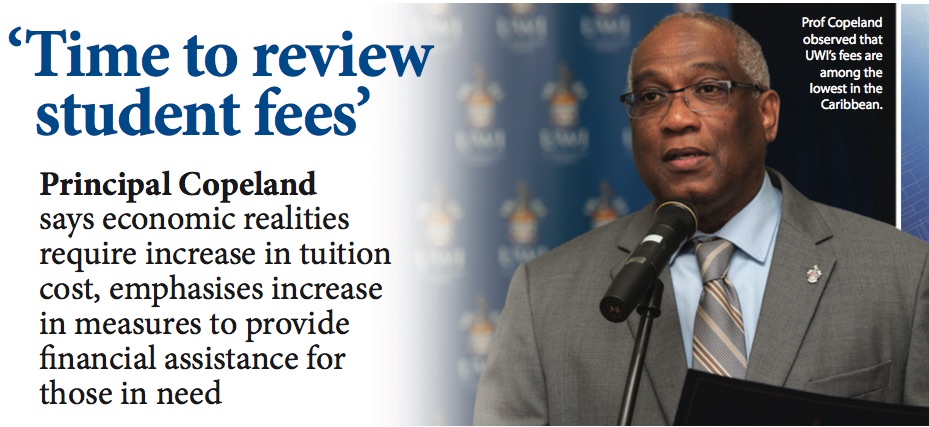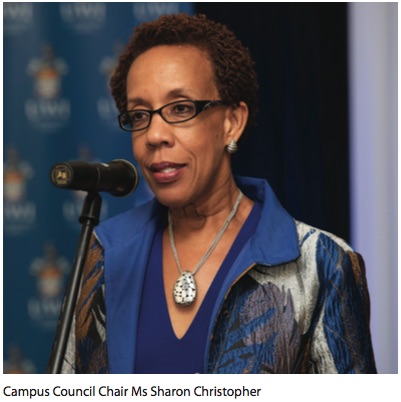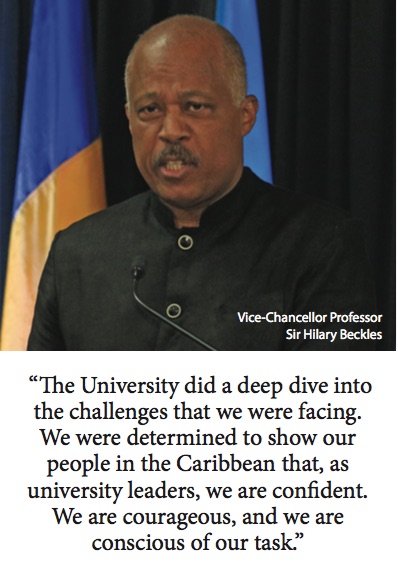
“We’d like to see a change in culture where students take responsibility for their tuition,” announced Pro Vice-Chancellor and Campus Principal Professor Brian Copeland at the recent St Augustine Campus Council meeting.
During the virtual session on Tuesday, March 15, Professor Copeland gave a detailed look into campus operations from 2020 to 2021. In attendance were Dr Nyan Gadsby-Dolly, Minister of Education; Vice-Chancellor of The UWI, Professor Sir Hilary Beckles; and Campus Chair, Ms Sharon Christopher.
Prof Copeland revealed eight focal areas which will be the foundation of the University’s 2030 vision: the delivery mode of courses; The UWI’s global market; deliverables; the funding model; processes; teaching and learning; research and scholarship; and staff.
Elaborating on funding, Prof Copeland underscored the campus’ stringent efforts to cut spending. “We have been undergoing change with response to incremental budget cuts in the past six years.” He added that cost reduction measures had helped trim about a hundred million dollars out of the university’s expenditure, but “the pain has been showing over the last two years or more”.
Even with these measures in place, he asserted the time has come for a review of student fees. Stressing that fees have remained the same for 21 years, Prof Copeland observed that UWI’s are among the lowest in the Caribbean. He explained that though students are supposed to cover 20 percent of the economic cost, the actual number is 12 percent. He emphasised the need for students to show accountability for the cost of their education. “We want to significantly reduce the dependence on governments across the region, and be a bit more flexible in our financing.” He affirmed that they are well aware of the financial constraints many students face. “We are not doing this in a draconian way, but we do have to do it.”
Prof Copeland said that 454 students have received a total of $4.3 million in support from non-governmental scholarships and bursaries. He added that this was small by all standards. He indicated that The UWI would be stepping up measures to support students who would need financial assistance. “We know that students are challenged, so you know that we’ll be pounding the pavements, looking to see if we could beef up the existing range of support provided to students.”
He asserted that they would engage with stakeholders and the Guild in the upcoming discussions and that nothing concrete has been decided as yet. He could not give a possible deadline for the final decision.

Prof Copeland indicated that he expected students to return fully to campus in September 2022, but he also addressed the evolution of the course delivery mode in UWI’s future. Hybrid classes will continue to be incorporated into the curricula. Some courses could be completely online or completely face-to-face or a combination of both. Hyflex – a blend of “hybrid” and “flexibility” – could also become options, allowing students more choice in their mode of learning.
During her remarks, Campus Chair Sharon Christopher announced that the large majority of the recommendations of the Chancellor’s Commission on governance report should be accepted. She also addressed the controversy that has been attached to the commission. “While public discourse is in itself welcome,” she stated, “the tone and content of much of the discourse was unfortunate to say the least.”
She explained, “What was recommended is that an executive committee of council, not of management, should be established and chaired by the Chancellor. This executive committee would have fewer members, would meet more regularly, and would be responsible for assisting council in carrying out its oversight responsibilities by being a first port-of-call, so to speak, for many of the matters that would come before council at its annual meeting.”
The commission also examined student fees. “The commission was mindful of the challenges being faced by regional governance to fund affordable tertiary education for its citizens on a long term, sustainable basis,” said Ms Christopher. She noted that the commission pushed for the provision of financial assistance for students in need.
Ms Christopher urged the student body to read the report carefully before coming to conclusions. “Do not just accept unsubstantiated rhetoric. Examine the facts. Come to your own point-of-view.”

Sir Hilary stated that the St Augustine campus has performed well over the past year, keeping doors open to students while foreign entities have been turning students away. “The University did a deep dive into the challenges that we were facing. We were determined to show our people in the Caribbean that, as university leaders, we are confident. We are courageous, and we are conscious of our task.”
He highlighted the diligence of the UWI Seismic Research Centre which he said saved many lives during the volcanic activity in St Vincent. He underlined UWI’s significant contribution to the region’s COVID-19 strategy. “Before the first case of COVID arrived in the Caribbean on March 13, we had already established a COVID task force,” he noted. “I have no doubt that we helped our region to save thousands of lives through our absolutely focused dedication.”
Both Ms Christopher and Sir Hilary took the time to congratulate Prof Copeland for his leadership as the time of his retirement nears. “His establishment of an innovation and entrepreneurship ecosystem, beginning in 2016 and expanding in scope every year since then, gave the St Augustine campus a head start in 2020 when the challenges wrought by COVID-19 first began to rear their heads,” explained Ms Christopher. Sir Hilary commended Prof Copeland for helping rally the UWI principals around the strategic plan. Of his leadership, he stated, “You have shown that St Augustine campus is resilient. When it is mobilised, our colleagues and our students are committed to a positive approach to the future.”
The Campus Councils are the governing body of The UWI. This annual presentation acts as a business meeting to highlight the performance of the University in the past year. It also debuts the annual and faculty reports.